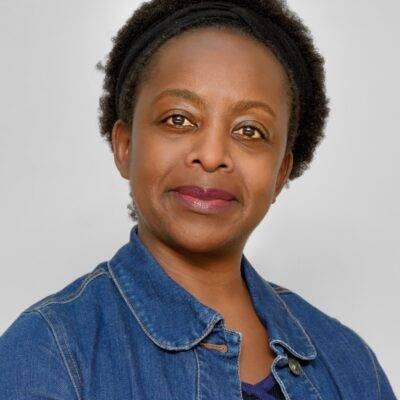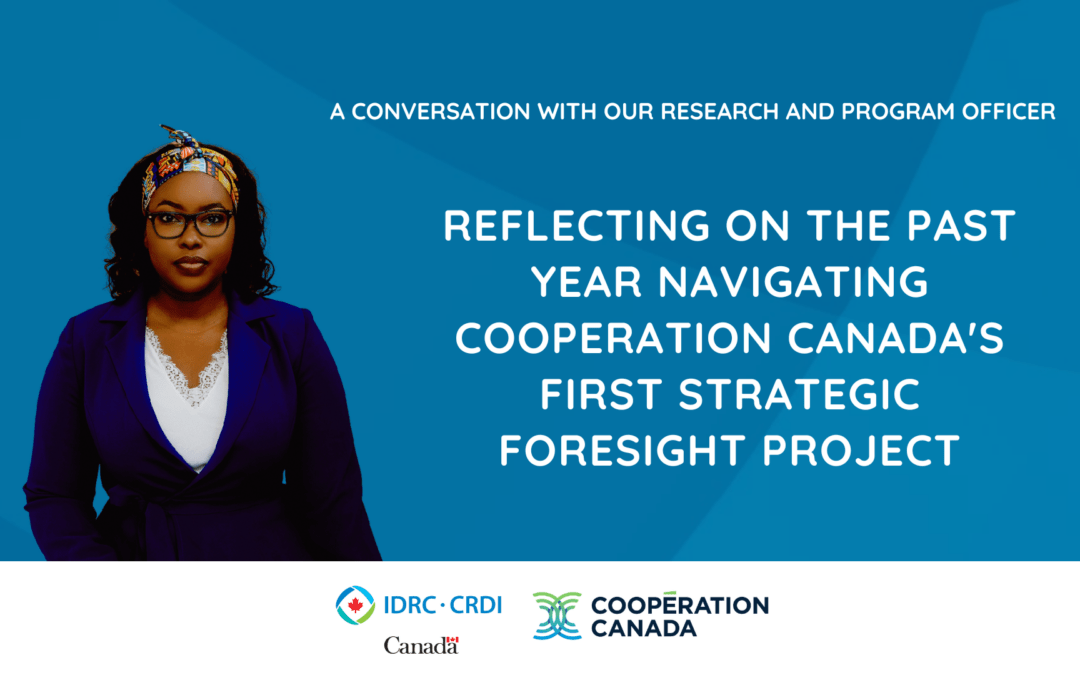
by Gabriel Karasz-Perriau | Feb 28, 2024 | Futures, News
A Conversation with Cooperation Canada’s Research and Program Officer, Andy Ouedraogo.
Andy Ouedraogo is the Research and Program Officer for Cooperation Canada’s first strategic foresight project, the Global Cooperation Futures Initiative, funded by the International Development Research Centre (IDRC). One year after the launch of the project, Andy recounts how far she’s come and presents a new report, the Landscape Analysis of the International Cooperation Sector.
You joined Cooperation Canada as Research and Program Officer to lead our first ever project on strategic foresight funded by the International Development Research Centre (IDRC). Now, a year in, where are we at?
It has been quite the journey and I’m happy to say that one year in, we have achieved quite a few milestones including the recent conclusion of our research-intensive phase commemorated with the launch of a Landscape Analysis of the International Cooperation Sector; a scan of emerging trends and drivers of change. We’ve also engaged close to 220 Canadian and global international development actors in our workshops, focus group discussions, and surveys, with a view to co-create knowledge and include as many voices and perspectives as possible.
Can you tell us how you managed to navigate the complex landscape of foresight?
Anticipating the future can be daunting. Leading this project feels like building a car while driving it. We are not only steering and navigating the vehicle but also installing components, fine-tuning the engine, and adjusting the design—all while on the move. During the first few months, the fear of not getting it right loomed like a shadow over my eager enthusiasm. Anticipating the future? Who, me? But I’ve learned to shift my focus away from achieving pinpoint accuracy and towards embracing the iterative process of refining strategy, incorporating new insights as they surface, re-assessing methodologies and course correcting where needed.
Futures don’t follow a script, and plans will inevitably change. Rigid timelines and linear approaches are not the most responsive to change and would limit one’s ability to identify new trends and emerging issues that could potentially be disruptive. Being adaptable and working with a strategic foresight partner who embraces flexible and agile methodologies has been key to navigate uncertainties and keep our project on course.
I will also add that good foresight hinges on the diversity of the data set, including input from a wide range of stakeholders. By engaging diverse voices and perspectives, we gain a more comprehensive understanding of potential future trajectories. An example of how Cooperation Canada did this is through our regional dialogues, organized in partnership with regional networks of CSOs in five different regions. These dialogues were instrumental in validating existing domains based on regional nuances, challenges, and future aspirations for the sector. Moreover, they enabled us to incorporate intra-personal observational knowledge, derived from participants’ firsthand observations of local change and their perceptions of the future of development influenced by local and regional events and trends.
Any lessons you could share or pieces of advice for CSOs seeking to venture into foresight?
The realization that the future doesn’t have to be a single fated outcome has been profound. Recognizing this plurality has broadened my perspective and highlighted the complexity of plausible future scenarios and so my first piece of advice would be to embrace the plurality of the future.
Then, I would say scope wisely to ensure relevance, actionability, and impact. Future studies could easily take you in so many directions, especially when looking into global systems. You quickly realize how interconnected the world is and may end up trapped in a giant spider web not knowing in which direction to go. By defining clear boundaries and objectives, not only have we been able to tailor the foresight process to suit our specific needs and context, but we were also able to choose appropriate methodologies, approaches, and tools that are best suited to the Futures Initiative.
My final piece of advice would be to opt for an iterative approach and emphasize process over precision. It is so crucial to allow space for continuous learning, experimentation, and improvement to ensure the relevance of the outcome.
The fun of strategic foresight isn’t just in the outcome; it’s in the process. It’s in the laughter during brainstorming sessions, the “aha” moments when a trend clicks, and the shared excitement when a foresight exercise sparks creativity. So, embrace the process.
What does the future look like for you?
Well, the future is much closer than you would imagine. With just two workshops remaining, I look forward to co-creating three transformative scenarios for international cooperation with CSOs and other development actors, as well as studying and discussing their implications for the next 7-10 years.
Click here to register for our scenario creation workshop!
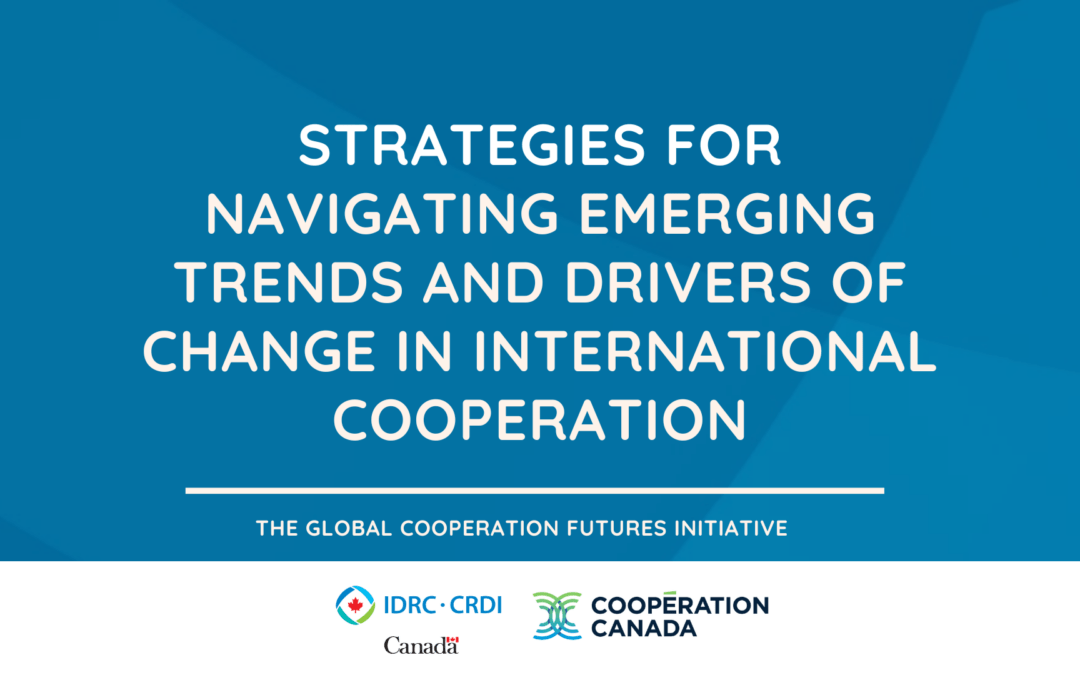
by Gabriel Karasz-Perriau | Feb 28, 2024 | Futures, News
The outlook for international cooperation actors for the coming decade is both uncertain and turbulent. That is the conviction behind our newly launched Landscape Analysis of the International Cooperation Sector, a scan of emerging trends and drivers of change, and an output of Cooperation Canada’s Futures Initiative. The Report links emerging trends and challenges with direct implications for international cooperation actors.
Rather than feeling overwhelmed by those implications, Civil Society organizations (CSOs) can equip themselves to effectively navigate this increasingly volatile environment and adopt innovative strategies that not only address emerging trends but also empower them to prepare for a range of plausible futures. Let’s explore four key strategies a Civil Society organization (CSO) can use to navigate uncertainty.
Strategic Foresight
Strategic foresight is a systematic approach to exploring alternative futures, anticipating potential challenges, and identifying strategic opportunities for action. Unlike traditional planning methods, which often rely on past trends and linear projections, strategic foresight embraces uncertainty and complexity, empowering organizations to navigate ambiguity and make informed decisions in the face of uncertainty. In another blog, I dive deeper into the importance of strategic foresight for CSOs, click here to read more.
Integrative Thinking
Integrative thinking is the ability to bridge siloes, forge links, and overcome the imperative of making unpleasant choices by mapping out and leveraging the interdependencies within and between systems for long term impact and resilience. Integrative thinkers refrain from binary choices and instead embrace the complexity of issues by synthesizing intuition, reason, and imagination. By building comprehensive models that consider various variables and causal relationships, CSOs can develop holistic approaches that engage diverse stakeholders and systems. Integrative thinking allows organizations to creatively resolve tensions and uncover opportunities that may have been overlooked. Embracing this mindset can enable CSOs to tackle multifaceted challenges with agility and effectiveness.
Impact Communication
With shrinking funding pools, CSOs must increasingly demonstrate their impact and effectively communicate their results. Merely showcasing the worthiness of a mission is no longer sufficient; donors increasingly demand evidence of tangible outcomes and social returns on their investments. CSOs need to invest in impact communication, where resonant storytelling plays a pivotal role. By sharing compelling narratives that illustrate how their work confronts inequity and drives positive change, CSOs can cut through the noise and inspire meaningful engagement from donors and stakeholders. Transparency, authenticity, and empathy are key elements of impactful storytelling that resonate with audiences and foster trust in the organization’s mission.
Diversification of Revenue Streams
In today’s ever-changing economic landscape, it’s imperative for Civil Society Organizations (CSOs) to take proactive steps in diversifying their revenue sources to bolster financial resilience. Our comprehensive landscape report underscores a growing trend among organizations, as they turn to digital currencies and explore private financing options to mitigate financial risks and drive innovation and adaptability. This strategic move towards revenue diversification gains heightened significance in the face of challenges such as the sovereign debt crisis, diminishing contributions from Official Development Assistance, and the shrinking civic space.
In conclusion, navigating the evolving landscape of international development cooperation requires CSOs to embrace innovation, resilience, and accountability. By adopting integrative thinking and foresight, diversifying revenue streams, and prioritizing impact communication, CSOs can proactively address emerging trends and drive sustainable progress in their communities. As agents of change, CSOs have the opportunity to lead by example and shape a more equitable and inclusive future for all.
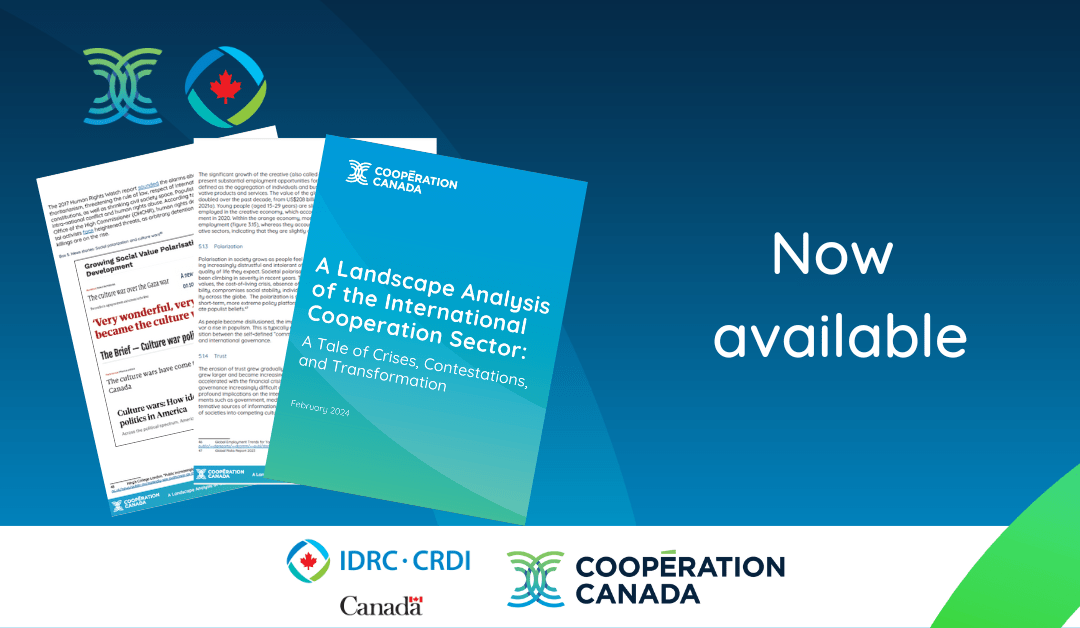
by Cooperation Canada | Feb 28, 2024 | Futures, News, Publications
Cooperation Canada is proud to announce the launch of our Global Landscape Analysis of the International Cooperation sector, a report of the Global Cooperation Futures Initiative funded by the International Development Research Centre (IDRC).
Drawing from a year of extensive research and insights from experts, our report provides a panoramic view of the challenges, trends, and emerging issues impacting international cooperation. As we stand on the cusp of unprecedented change, this analysis offers invaluable insights into the pressing issues facing the international community. From geopolitical shifts to economic warfare, climate change, and the digital divide, this report highlights the interconnectedness across and between issue areas and their implications for international cooperation actors.
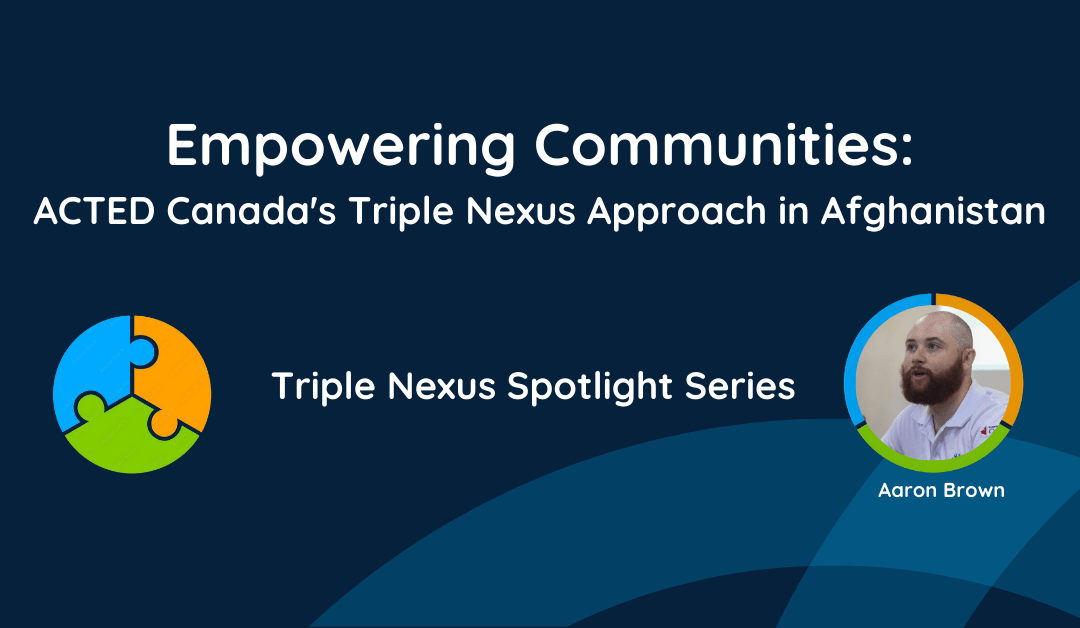
by Cooperation Canada | Feb 28, 2024 | News, Policy
ACTED Canada, as part of a global network, is dedicated to a unique approach known as ‘Triple Nexus.’ This approach combines three critical areas: humanitarian aid, development initiatives, and peace-building efforts. The goal is to create sustainable and impactful programs in challenging environments. ACTED’s commitment is reflected in its 3ZERO vision, which aims for Zero Exclusion, Zero Carbon, and Zero Poverty. This vision underlines our dedication to inclusive and sustainable development and maintaining peace. By working closely with Canadian and international partners, ACTED Canada plays a significant role in advancing the Triple Nexus approach globally.
AGORA’s Role in Implementing the Triple Nexus
AGORA, a strategy developed by ACTED, is central to implementing the Triple Nexus approach effectively. It is an area-based method that focuses on integrating local knowledge and needs into program planning and execution. This involves identifying local areas, engaging community members to understand their needs, and then addressing these needs in a way that fits the local context. AGORA helps ACTED effectively respond to immediate humanitarian crises, support long-term development, and contribute to peacebuilding in areas with complex challenges.
Case Study: Sustainable Rural Development in Afghanistan
In Afghanistan, AGORA’s implementation within the Triple Nexus framework was critical in creating sustainable, peaceful communities. Focusing on local areas known as “manteqas,” the program integrated humanitarian aid with development and peacebuilding efforts. For example, in agricultural improvement projects, AGORA ensured that the initiatives addressed not just food insecurity but also contributed to managing conflicts related to resources. This holistic approach was vital in addressing immediate needs and building long-term resilience.
Challenges and Lessons from the Triple Nexus Implementation
Although highly effective, the application of a Triple Nexus approach through AGORA in Afghanistan highlighted several challenges:
- Inclusive Engagement: Engaging diverse and marginalized groups in decision-making was complex, often impacted by cultural and societal barriers. This is amplified when working across the development, humanitarian, and peace sector.
- Balancing Immediate and Long-term Needs: It was challenging to manage resources effectively for immediate humanitarian needs while also focusing on long-term development and peacebuilding.
- Adapting to Security Situations: The evolving security scenarios in Afghanistan required constant adaptation of interventions.
These challenges emphasize the need for strategies that are adaptable, context-sensitive, and heavily involve the community for effective implementation.
Broader Implications for a Triple Nexus Approach
The success of the Sustainable Rural Development Program in Afghanistan serves as a testament to the effectiveness of a Triple Nexus approach. It demonstrates how approaches that are participatory and localized can address complex challenges encompassing humanitarian aid, development, and peacebuilding. This case study provides a blueprint for applying similar strategies in other complex environments.
Conclusion
ACTED Canada’s application of the AGORA methodology in Afghanistan is a prime example of the innovative and transformative potential of the Triple Nexus approach. Their work goes beyond addressing immediate needs; it sets the foundation for a future that is resilient, peaceful, and sustainable. This approach can serve as a model for integrated development efforts across the globe.
This piece is authored by Aaron Brown, Project Development Officer, Acted Canada
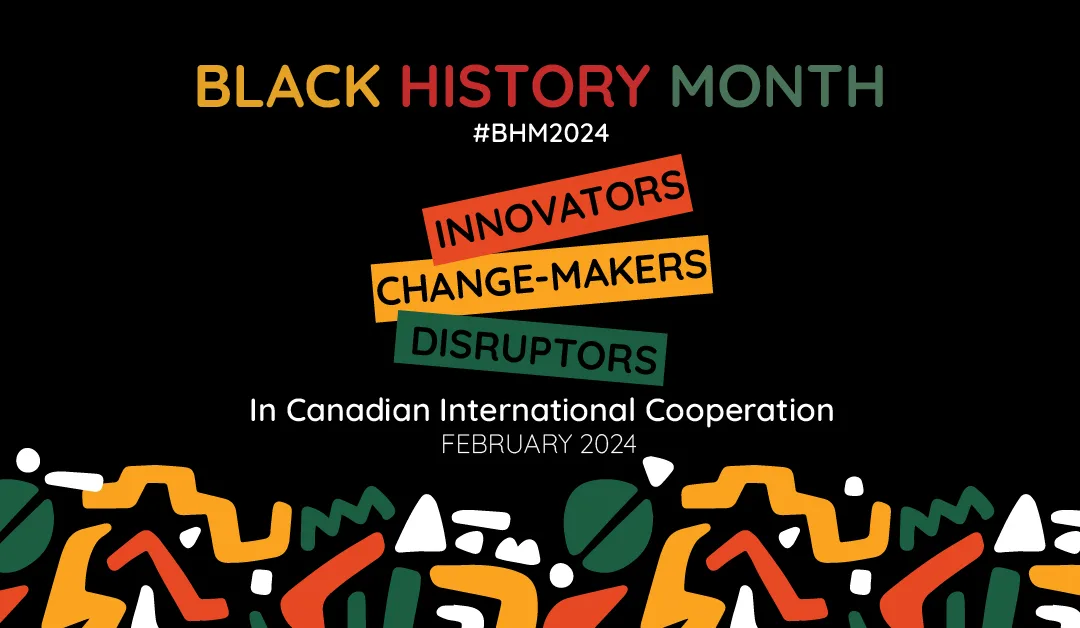
by Cooperation Canada | Feb 26, 2024 | Anti-racist cooperation, ARC Hub, News
Interview with Musu Taylor-Lewis, Executive Director of Food for the Hungry
1. Why did you decide to work in international cooperation and what have been some career highlights?
For a long as I can remember I’ve wanted to contribute to economic development. My family is from Sierra Leone and my parents instilled in us a sense of community responsibility. Growing up in different parts of the world made me super conscious of the unequal opportunities available to people depending on where they were born and I have never been comfortable with that reality.
Meeting people whose stories I had written or told in project reports is a highlight of my career. It is a profound reminder to hold our responsibility as mediators of those stories with humility and care. Serving as a member of the inaugural advisory committee for the development of an anti-racism action plan for the Canadian international cooperation sector and being able to contribute to the production of the framework for anti-racist change. I cannot describe how I felt when the first report was completed. It really represented its name as a collective commitment to change and my heart sang!
2. What experiences have influenced your career as a Black person in the international cooperation sector?
My Aunty Amina’s story. My father’s sister never had the opportunity to attend school and when I think of the disparity in her life and her brothers’ lives and the difference that continues to make for my siblings and our cousins, I remain aware that inequality affects generations. So it is very personal for me to see the disparity extend at national and international levels. It means whole communities are being held back to the detriment of us all. Humanity cannot live up to its full potential while so many are kept from making the contributions they are capable of, given the right opportunities.
3. What are your hopes for the future, and what advice would you give to those wishing to work in international cooperation?
I am an unapologetic idealist. I hope for a future where everyone has the opportunity to live up to their full potential. A future where health services, food and education are not luxuries for anyone in the world, no matter where they live or their level of wealth. For someone coming into the sector I would tell them that this is not work for superheroes, there is no magic formula for change, it is slow collaborative work to chip away at the structures that disadvantage different peoples. You may not be able to change the whole world, but you can make a change in the world, just find a corner and start chipping away, you’ll find others to lean on. Idealism has to be tempered with realism so that you don’t burn out or become disillusioned.

by Cooperation Canada | Feb 15, 2024 | Anti-racist cooperation, ARC Hub, News
Interview with Carelle Mang-Benza, Policy Lead at Cooperation Canada
1. Why did you decide to work in international cooperation and what have been some career highlights?
When I first worked with a bilateral donor many years ago, I was more interested in the subject matter (environmental policy) than the sector of international cooperation. I gradually grew to discover, appreciate, and critique the sector, as I moved from bilateral to multilateral cooperation.
Everything I consider as a professional highlight is tied to human experiences working in and with countries where programs are implemented: that conversation with a teenage girl victim of sexual abuse in a displacement camp; that 10-y old boy who voiced his grandmother observations about climate variations over her lifetime; that seasoned farmer who found the boldness to share his experience in land management in front of the agriculture experts; that UN colleague whose program funding shortage was solved by the local community and their diaspora relatives; and so many others…
2. What experiences have influenced your career as a Black person in the international cooperation sector?
The above experiences have shaped my professional opinions as a person. They probably resonated with me in this way because, as a Black woman, I can see racially motivated behaviors, hear prejudice-laden language, and feel when people assert their agency and power a certain way. I have to say that I have been equally influenced (and irritated) by self-destructive behaviour and self-victimizing language.
3. What are your hopes for the future, and what advice would you give to those wishing to work in international cooperation?
My hope is to see the power shift (often called localization) agenda gain greater momentum to transform international cooperation practices. Those wishing to work in this sector should be comfortable not with the present of the sector but rather with a future where power and authority will be more equally distributed.
Carelle Mang-Benza
Policy Lead






